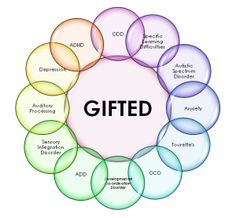What Does Giftedness Mean? Unraveling the World of Gifted Children
Hello, amazing parents! Have you ever wondered what it truly means when someone mentions that a child is gifted? It’s like a buzzword that’s everywhere – school meetings, parenting blogs, and education forums. But fear not! We’re here to hop on a journey of discovery and understanding about the fascinating world of giftedness.
When we hear the term ‘gifted,’ images of children solving complex math problems at lightning speed or playing Mozart flawlessly might flash through our minds. However, giftedness is a bouquet with more than just academic petals. It’s time to dive into this concept and unwrap its many layers.
A Peek Into Giftedness
So, what is giftedness? The National Association for Gifted Children (NAGC) defines it as individuals who demonstrate outstanding levels of aptitude or competence in one or more domains. These domains can include anything from intellectual, creative, artistic to leadership abilities, or specific academic fields.
That sounds pretty broad, right? That’s because giftedness doesn’t come in a one-size-fits-all package. Each gifted child is unique, with their own set of impressive abilities and challenges too.
Characteristics of Giftedness
Here’s where things get interesting! Gifted children often showcase some common traits that make them stand out. Let’s take a closer look at a few:
- Curiosity: They usually have an insatiable curiosity about the world around them. They want to know the ‘hows’ and ‘whys’ of everything!
- Rapid Learning: Gifted children tend to grasp concepts quickly and often require less repetition to master new skills.
- Complex Thinking: They can understand complex ideas and are often creative problem-solvers.
- Intense Emotions: Their emotional depth can be as profound as their intellectual capacity; they feel deeply and passionately.
- Advanced Language Skills: Many display a remarkable aptitude for language and express themselves quite eloquently.
These are just a few snippets of the tapestry that makes up a gifted child’s profile. However, it’s crucial to remember that not all gifted children will exhibit these characteristics, and those who do may not show them in the same way or intensity.
Nurturing Giftedness
Understanding your child’s giftedness is only the tip of the iceberg. The real adventure starts with nurturing their talents. And you, the super-parents, play a massive part in this chapter of their story.
Start by encouraging their curiosity. Provide them with opportunities to explore and challenge their minds. Recognize their need for mental stimulation and find activities or programs that cater to their thirst for knowledge and creativity.
Embrace their emotional intensity. Be the supportive harbor when the waves of their feelings seem overwhelming. Help them navigate through their emotions, teaching them to understand and express them healthily.
Lastly, advocacy is key. Get involved in their education, communicate with their teachers, and explore options for gifted programs. Remember, your goal is to create an environment where they can grow, learn, and most importantly, thrive!
All right, wonderful parents, we have just begun scratching the surface of the giftedness iceberg. Stay tuned, as our journey continues in the quest to better understand and support the gifted children who bring so much light and wonder to our lives.
Keep an eye out for more pearls of wisdom, practical tips, and heartwarming advice in the rest of our comprehensive guide. Because, after all, our mission is to ensure the giftedness in every child is recognized, celebrated, and nurtured to its fullest potential. Let’s create a world where your little geniuses can soar to unimaginable heights!
And with that, let’s keep the flame of curiosity burning and the stream of knowledge flowing. Stay tuned for more insights that will illuminate the path of giftedness and help you foster an environment where your child’s exceptional talents are not just recognized, but truly cherished.

5 Things Parents Should Know in Preparing for Giftedness
When you’re equipped with the right knowledge and tools, you’re halfway through the journey of nurturing a gifted child. Below are five essential points you should know:
- 1. Giftedness Is More Than Just Intelligence: Giftedness isn’t solely about having a high IQ. It encompasses a wide range of abilities, including creativity, leadership potential, and specific academic prowess. It’s about how a child processes information and their capacity to engage with ideas on a deeper level.
- 2. Early Identification Is Beneficial: Recognizing giftedness early can help you to provide the right kind of support and opportunities that your child needs. This does not mean pressuring them but rather guiding their natural abilities in a positive direction with appropriate challenges and enrichment.
- 3. Social and Emotional Support Is Crucial: Gifted children can experience heightened sensitivity and emotional intensity. They may also struggle with social interactions, feeling out of sync with peers. It’s important to nurture their emotional intelligence and help them develop social skills.
- 4. Tailored Education Is Key: A one-size-fits-all approach to education may not work for gifted children. Look for programs and schools that offer specialized curriculums or differentiated learning to accommodate their advanced levels of understanding and skill.
- 5. Advocacy Will Open Doors: As a parent, advocating for your child’s needs is vital. Whether it’s working with educators to tailor your child’s learning experience or seeking out enriching extracurricular activities, your proactive involvement can make a significant difference.
Now let’s delve deeper and explore each of these elements to prepare you for the exciting journey ahead with your gifted child.
1. Understanding the Spectrum of Giftedness
Recognizing the multifaceted nature of giftedness is the first step. Gifted children can exhibit excellence in creative thinking, leadership, artistic talents, and more. Therefore, it’s important to provide diverse experiences that nurture all aspects of their abilities – not just the academic side.
2. The Importance of Early Detection
Catching signs of giftedness from an early age will allow you to guide your child appropriately. Opt for assessments and evaluations conducted by professionals if you suspect your child might be gifted. These assessments can help in creating a learning plan that aligns with your child’s unique abilities.
3. Emotional and Social Development
Understanding and managing emotions can be a challenge for gifted children due to their intense emotional nature. Encourage them to express their feelings, and consider therapy or counseling if needed. It’s equally important to facilitate social interactions where they can find intellectual peers and true friendships.
4. Seeking the Right Academic Fit
Your child might benefit from advanced courses, a gifted program, or even grade skipping if appropriate. Engage with educators to ensure that your child’s learning environment is stimulating, engaging, and sufficiently challenging to prevent boredom or disengagement.
5. The Role of Advocacy in Gifted Education
Become your child’s advocate in educational settings by communicating with teachers and administrators about your child’s requirements. Being informed about federal, state, or local policies regarding gifted education is also important. Joining parent associations for gifted children can offer additional support and resources.
Remember, nurturing giftedness is a collaborative effort among parents, educators, and the children themselves. With love, patience, and the right approach, your child’s giftedness can bloom into a thriving future. Keep learning, keep supporting, and watch the magic unfold in your child’s gifted journey.
See more great Things to Do with Kids in New Zealand here. For more information see here
Disclaimer
The articles available via our website provide general information only and we strongly urge readers to exercise caution and conduct their own thorough research and fact-checking. The information presented should not be taken as absolute truth, and, to the maximum extent permitted by law, we will not be held liable for any inaccuracies or errors in the content. It is essential for individuals to independently verify and validate the information before making any decisions or taking any actions based on the articles.




